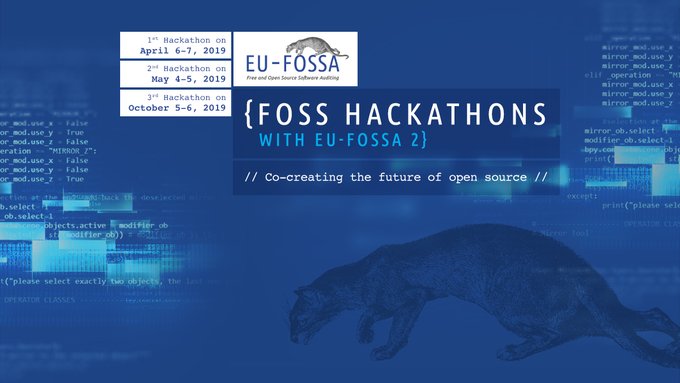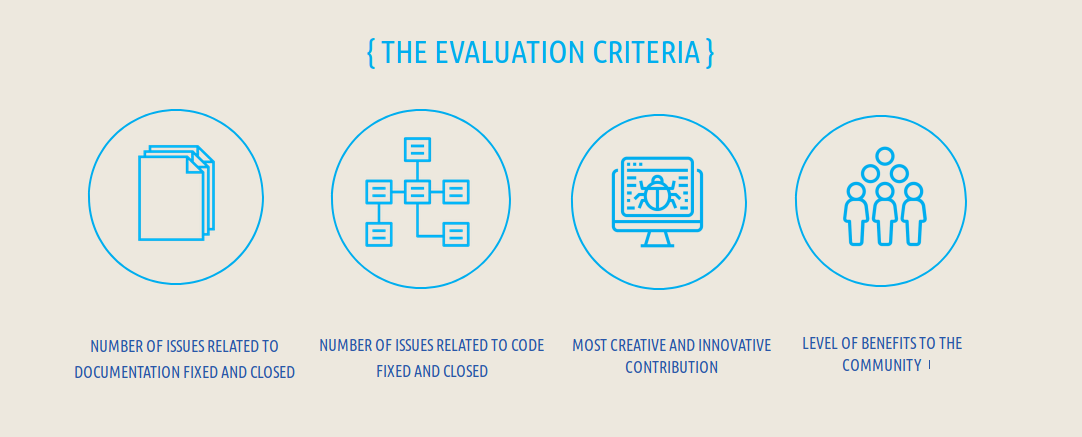Experiencing an Hackathon organized by the European Union
I was lucky to be part of a very special hackathon with Apache projects in Brussels organized by the EU.

The second FOSS Hackathon organized by EU FOSSA in May hosted a event were a few Apache Software Foundation communities came together to meet in person. Some of the communities are older and mature projects like Apache Tomcat and others were pretty small, young or lesser know communities. The event was a chance for people who work together but never met in person to come together and for communities to get to know each other.

For more information about EU FOSSA and the context about the event read my post published at the same time. This post is more about my experience at the event and some opinionated thoughts on the event and efforts in open source. If you want to know more about what each community did at the event have a look at the work in progress homepage on Github. This page is still not quite done because the attendees are editing the content via Pull Requests.
I attended not as part of any of these projects but more as an open source enthusiast. I have been watching Apache communities from a little bit apart for some time. I quickly met other attendees completely new to all of these projects as well. I think it was a great idea to invite other people like students and me to get a different view on things, share knowledge and the values of the Apache community.
I have to start with a big thank you to the organizers. Even though my application was done last minute travelling to Brussels and attending turned out perfect for me. It was a pleasant experience to be there, the team was really nice and organized everything. The hotel and the venue at Silversquare Triomphe provided a great environment to talk to people and work on the projects.
After some opening words and an introduction about the EU and FOSSA the attendees started discussing and working on their projects. Attendees not affiliated directly to their projects joined the groups and participated in many ways.
It quickly came clear that we won’t follow the agenda that was used at the previous hackathon. I think the organizers did a great job by going out of the way letting the community decide what to do on their own pace, “The Apache Way”. I and probably others got the impression that working with open source communities does not work with a schedule and clear goal but more organically. We just did what we wanted to do and came together in the conference room when time felt right to present what we are doing. We really got the chance to make it our event and it turned out to be fun and productive.
I did not write any code myself at this weekend. I did write some text on the website that was created collaboratively and the posts on my blog. I usually prefer coding over meetings, documentation etc. but this time was different. Talking to everybody was really interesting and inspiring and I could work on my communication and writing skills. This really is the spirit of the event since sharing knowledge and the community is more important than producing code. The projects at the event are mostly written in Java and I am familiar with Java development to some degree, but personally I need to become familiar with a codebase for some time to write useful code. I did read a lot of code of the projects. I also built some projects myself from source code and got an introduction of interesting parts of the projects. Other participants did some impressive work done in code in a short period of time. I think talking to people, learning new technologies I never heard of before, helping with documentation and getting spirit of Apache was even more important to me at the event.
Experienced Apache committers suggested to have a key signing. Some attendees including me and members of the Commission never did such thing and it was another opportunity so see and talk about how open source works. Key signing and the Web of trust is an important practice for open source communities to ensure trust and security. So this fitted perfectly into the environment of the hackathon.
Heartbleed, one of the triggers to start EU FOSSA, was a topic of discussion to during the event. Some people remembered what they did at the time and how significant it was for some organization. This showed me how critical smaller software projects can be without anybody really noticing it. That’s why initiatives like FOSSA are so important. Much of the big buzz and attention in open source goes to big projects by large corporations or foundations. They often have lots of money and manage open source projects like commercial products inside a company. Smaller projects like OpenSSL that are used by millions of products look like old unsexy projects nobody notices. But security in these projects is critical for the security of millions of users. Apache has many important projects and they are all community led projects that have their own spirit and way of doing work.
Tomcat is a good example. It is very mature project which has been a trusted solution for many years. The development on Tomcat moves more slowly than on shiny new projects because the focus is on stability. The community is aware of its duties towards Tomcat users and produces reliable releases. That’s why decision making and talking about changes as community is more important than working on code. It really surprised me to hear that for some releases only three people are making a decission for releasing a such significant project. Everybody can build Tomcat from source very easily and vote for releases. Just a little bit more participation could improve the Tomcat releases and spot bugs.
Open source like it is executed at Apache is really different from open source done by company. I think activities like this one really help organizations like the EU to understand it and find ways to support it.
Another important thing on my point of view is to build awareness about open source. I think that’s another purpose of the hackathon to raise awareness inside the EU institutions what is all about. But for me as an open source developer it is also important that people in the open source community are involved in the conversation with public institutions like the EU what they can do to collaborate. EU FOSSA is becoming better at communicating what they are doing and what their mission is. Having people directly involved also helps to share it with a broader audience and getting more traction. Writing about it and posting on social media is just a small contribution.
FOSSA is just the start of the journey. The EU needs to figure out which way is the best or most effective way to improve security and quality of open source software by supporting its communities. Hackathons or other kind of events could be one way.

During one of roundtables we shared our thoughts that it is hard to measure success. Metrics like issues closed or security bugs fixed don’t really capture the value of the event. Building the Community is probably the most important thing. Being together in one room really has lasting effects. Because many different projects came together synergies were found that will show achievements in the future.

Another important aspect is capturing what happened at the event. An website for the event was created collaboratively using Github. I think this is a perfect idea because Github is already part of the developers tools and was really helpful to write down what we did together.
You can clearly see that FOSSA 2 is doing many different things to figure out how to approach challenges in open source. I think this is really the best way to do since nobody knows what’s best. I really hope that FOSSA 2 becomes a permanent budget item after its end and the preparatory action is successful. What FOSSA is doing is not only important for the EU institutions but also the public. Spending public money on open source solutions for public institutions really makes sense. The limited time and budget of FOSSA should be spent responsibly to ensure the measures found in that project become a permanent thing on the EUs agenda.
Open source has many aspects. I cannot capture everything I am thinking about to words, but I tried my best to document what happened at the hackathon. I am very positive about what has been done by FOSSA and hopefully will come in the future.
I hoped you enjoyed this post and I am almost certain I am going to write more about FOSSA and open source in general.

Participants for the 2nd edition were invited Apache members and interested people like me. I found out about the event on Twitter by @EU_DIGIT just a few days before. I applied through the online form on the website and got accepted. Attending the event was free and transport and accommodation was covered by the organizers.
